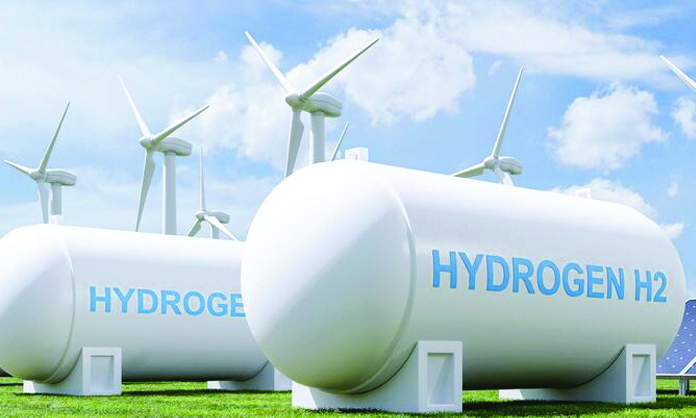WITH the energy industry, especially green hydrogen and oil and gas, being touted as a panacea for Namibia’s unemployment and poverty woes, articles involving these sectors dominated the business landscape this year. These are a few of the notable stories.
600 000 NEW JOBS?
President Hage Geingob said in October that Namibia’s burgeoning green economy could potentially usher in an era of unprecedented job creation, nearly doubling the existing employment numbers within the next 17 years.
However, economists call this “an exaggeration”.
Geingob, while delivering his keynote speech at Africa Energy Week in Cape Town, said this transformative shift to green hydrogen could result in the generation of over 600 000 fresh job opportunities.
“This is almost double the size of our existing formally employed labour force. These are opportunities we cannot ignore,” Geingob said.
However, economist Omu Kakujaha-Matundu said this figure is highly exaggerated.
24% GOVT STAKE IN HYPHEN
In May, the government announced it had an option to buy a 24% stake in the Hyphen green hydrogen project during the signing of the project’s feasibility and implementation agreement.
This offer drew mass criticism from Affirmative Repositioning, which approached Hyphen to demand that the government be granted a free 24% stake in the green hydrogen project the following month.
In October, green hydrogen commissioner James Mnyupe eventually announced that the government was strategising to use the potential income generated from its recent oil and gas findings to buy a 24% stake in the untested Hyphen Hydrogen Energy green hydrogen project.
SHELL COMMITS 2023/2024 BUDGET TO ORANGE BASIN
In November, Shell announced its plans to spend a quarter of its deep-water exploration budget for 2023 and 2024 on its oil and gas discoveries in Namibia’s Orange Basin.
This statement was made after an eventful year of exploration and appraisals in the region by Shell and its consortium partners.
In March, Shell made a minor oil discovery in the Jonker-1X deepwater exploration well in the PEL-39 exploration licence and a positive find in July.
In September, however, Shell’s test of the Cullinan-1X exploration well did not prove fruitful.
“The well did not make a discovery, however, we are encouraged to have found indications of a working petroleum system in this previously untested area of our licence,” Shell wrote in a statement.
POSITIVE APPRAISALS FOR TOTAL
In September, TotalEnergies confirmed positive appraisal results from its Venus-1A well and a “positive flow test” at its Venus-1X well. The Venus prospect is located in block 2913B in the Orange Basin and operated by Total with a 40% stake and the National Petroleum Corporation of Namibia (Namcor) with 10% a stake.
Analysts lauded that Namibia could surpass Angola as the ‘golden’ block of TotalEnergies.
RAW MINERAL EXPORT BAN
Geingob reiterated the Namibian government’s stance to ban the export of raw minerals to improve the sustainability of the extractive industry and develop local processing, refining, recovery and recycling capacity in Namibia.
This caused an eruption of calls encouraging the legislation of the beneficiation strategy by politicians and legislators alike.
Swapo backbencher Natangwe Ithete said if the president’s statement is not formulated into a policy, it would remain a statement.
JAPAN, NAMIBIA SIGN CARBON REDUCTION AGREEMENT
On 4 December, Namibia signed an agreement with the Japan Bank of International Cooperation on the sidelines of the 28th United Nations Climate Change Conference (COP28). The agreement will guide Namibia and Japan’s collaboration on the development of carbon-combatting projects and infrastructure.
Finance and public enterprises minister Iipumbi Shiimi said the agreement is the culmination of work between the two countries to establish collaboration in the area of economic, environmental and social sustainability.
N$102 MILLION FOR HYPHEN HYDROGEN PROJECT
On 7 December, Hyphen Hydrogen Energy finalised a €5 million (N$102 million) agreement with the Development Bank of Southern Africa on the sidelines of COP28.
The agreement outlines a project preparation funding facility to progress the development of Hyphen’s green hydrogen project in Namibia.
The funds will finance the engineering, environmental and socio-economic development work streams of the project.
DAURES WATER SUPPLY WOES
This year, The Namibian reported on the water source challenges faced by the Dâures Green Hydrogen Village.
In July, Dâures chief executive Jerome Namaseb told The Namibian the consortium had not decided on a water source yet.
Questions around a consistent and sustainable water supply considered whether the project would source from Ugab River or the Atlantic Ocean. The green hydrogen consortium clarified in a statement following the report that it would be sourcing water from eight on-site boreholes using reverse osmosis for the pilot phase.
“Needless to say, there are no plans to source water from the Ugab River,” the statement said.
ONLINE MINING APPLICATIONS
This year, mines and energy minister Tom Alweendo announced that the ministry will launch an online licence application system in 2024.
Alweendo said the new system will make it easier for individuals to apply for licences wherever they are. He also said it will improve the processing of the licences when submitted.
“We have reviewed our licencing system, whereby as of January next year we also make it possible for people to apply for these licences online – you will not have to come to the Ministry of Mines and Energy to submit your application,” he said.
The ministry has also implemented a submission window period for licence applications, with four windows per year.
GREEN HYDROGEN
PIPELINE FLAGGED
This year, environmentalists strongly cautioned against a proposed plan that intends to construct a green hydrogen pipeline from Namibia’s Kunene region to Boegoebaai in South Africa’s Northern Cape province. They raised concerns about the pipeline’s potential impact on indigenous communities, national parks, animals and plants that inhabit the Namibian coast, which has been declared the eighth largest marine protected area in the world and the largest in Africa.
While the Namibian and South African governments say they have met with rural communities and assessed potential damage, environmentalists stood their ground saying nothing has been done to ensure the environment is not damaged.



Leave a Reply